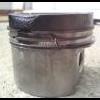I'm trying to find out the correct torque setting for the sump drain bolt on my 1995 Cooper 1.3i? I just got it on Monday, the garage did an oil and filter change as part of the deal but I have a seep on the bolt. Don't want to tighten it too much for fear of stripping either the thread or the bolt. Can anyone help please?
Thanks
Gary
Sump Drain Bolt - Torque Settings
Started by
Gary P
, Jul 10 2008 10:10 PM
4 replies to this topic
#1

Posted 10 July 2008 - 10:10 PM
#2

Posted 10 July 2008 - 10:23 PM
I'd like to know this too, mine is dripping oil slowly. Going to replace the washer tomorrow as I didn't put a new one on when I did it last.
#3

Posted 10 July 2008 - 10:24 PM
which suggests they have not changed the copper washer...
The bolt should only be nipped up, but actual figure is 25 lbft
The bolt should only be nipped up, but actual figure is 25 lbft
#4

Posted 10 July 2008 - 10:33 PM
tip:
If you do need to reuse the copper washer, heat it up until it's cherry red and then dunk ( sorry quench )... it softens the copper up again.
)... it softens the copper up again.
If you do need to reuse the copper washer, heat it up until it's cherry red and then dunk ( sorry quench
Edited by GuessWorks.co.uk, 10 July 2008 - 10:34 PM.
#5

Posted 11 July 2008 - 02:17 AM
No need to quench the copper with rapid cooling. It will be nice an softly annealed just by applying the heat and letting it cool naturally.
Quenching is a process where you rapidly cool a heated metal, typically steels. It works by locking the carbon in the steel in a different relationship to the grain boundaries of the steel's crystalline structure. Once steel is quenched, it typically must be tempered (raised to a high... but not as high temperature) to relieve some of the stress introduced by quenching. In short, quenched steel is typically hard and brittle and to be useful it must be tempered to restore some of it's toughness. Annealing, the heating of a metal followed by slow cooling, relieves mechanically introduced stresses from work hardening.
The Materials Science Lecture is now over.
Back on the subject of sealing washers, on my Mini I use a bonded metal/rubber drain plug seal instead of the copper washer. There is not a proper one for the 5/8 UNC thread of the Mini drain plug but you can use a 14mm one with a little work getting it over the threads. With the bonded seals all you need to do is snug up the plug until the metal parts touch. When this has happened the rubber is compressed and forms the seal. The rubber also prevents the plug from backing out on its own.
EDIT: The picture in the link below shows the bonded metal/rubber seal type I'm using.
http://www.famcom-in...onded-seals.jpg
Quenching is a process where you rapidly cool a heated metal, typically steels. It works by locking the carbon in the steel in a different relationship to the grain boundaries of the steel's crystalline structure. Once steel is quenched, it typically must be tempered (raised to a high... but not as high temperature) to relieve some of the stress introduced by quenching. In short, quenched steel is typically hard and brittle and to be useful it must be tempered to restore some of it's toughness. Annealing, the heating of a metal followed by slow cooling, relieves mechanically introduced stresses from work hardening.
The Materials Science Lecture is now over.
Back on the subject of sealing washers, on my Mini I use a bonded metal/rubber drain plug seal instead of the copper washer. There is not a proper one for the 5/8 UNC thread of the Mini drain plug but you can use a 14mm one with a little work getting it over the threads. With the bonded seals all you need to do is snug up the plug until the metal parts touch. When this has happened the rubber is compressed and forms the seal. The rubber also prevents the plug from backing out on its own.
EDIT: The picture in the link below shows the bonded metal/rubber seal type I'm using.
http://www.famcom-in...onded-seals.jpg
Edited by dklawson, 11 July 2008 - 03:01 AM.
1 user(s) are reading this topic
0 members, 1 guests, 0 anonymous users
















